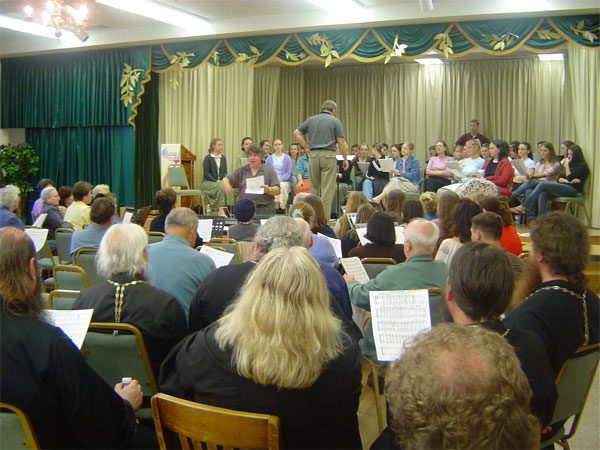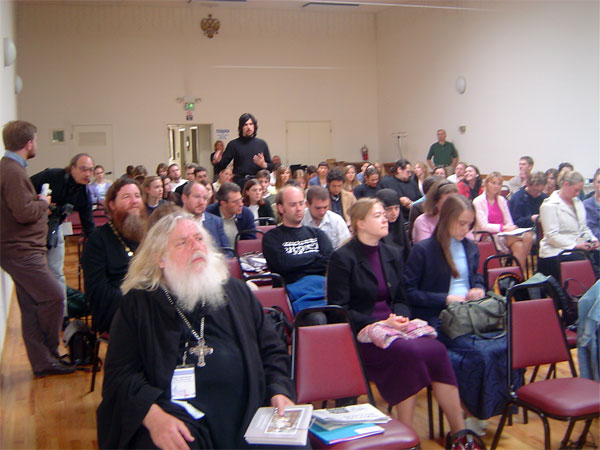NEWS
FROM THE DIOCESES |
|
SAN FRANCISCO: June 29, 2004 |
|
Round-table on the Relationship Between the ROCOR and the ROC/MP On Tuesday, June 29, after lunch, a round-table discussion was held on the present state of the Russian Church. Protopriest Sergei Kotar began by recounting the history of the changes of his view of the Moscow Patriarchate. Fr. Sergei himself always grieved over the problems of the Russian Church and the Russian people. He considers himself a member of that group of Russian ĪmigrĪs who "lived on their suitcases," that is, attentively followed events in the Soviet Union, reacted to them, and was ready to move there if the conditions of Bolshevik terror changed. For this reason, Fr. Sergei participated for many years in the "Ochag" [hearth, breeding ground] project, which worked on reprinting and sending banned literature to the USSR. His many years of contact with Archbishop Anthony (Medvedeff) of blessed memory, who always displayed a great love and understanding for all the needy, helped Fr. Sergei to look upon his suffering compatriots in the homeland without prejudice. On the other hand, travels and contact with church dissidents at the very beginning of perestroika caused him some consternation, especially when it was apparent that these dissidents did not attempt to cooperate in their opposition to the existing political and ecclesiastical order, but actually competed with one another. This created the impression that dissidents were not interested in church or political issues, but in their own glory. Finally, in December 2003, Fr. Sergei went to the Expanded Clergy Conference in Nyack, NY, with an open mind, and eager to learn about the actual state of affairs. Listening to the representatives of the Moscow Patriarchate, and also to those who were in the extreme, and often illogical expressions of the opposition, Fr. Sergey understood that the time has come to leave the past behind, and to begin to work towards overcoming differences. After the morning lecture of Protopriest Maksim Kozlov, "To be Orthodox in Russia Today," Fr. Sergei clearly saw that the problems in Russia and abroad are analogous: we, Orthodox, are in the minority, living in fact within a pagan (or post-Christian) world. Fort his reason, in order to overcome these problems with the aim of leading souls towards salvation in Christ, it is necessary to apply all our efforts for the elimination of disagreements in the Russian Church. Then, Protopriest Maksim spoke of the feelings of many faithful who were born in the USSR. Such believers hoped that the time would come when it would be possible to be openly faithful, to attend church freely, and not fear losing their jobs or residency documents. At the same time, these people did not dare hope that they would see such a time come in their lifetimes. Fr. Maksim had never met anyone from the Catacomb Church, had no contact with them, and no one from among his acquaintances had any, either. But the Church Abroad was known, some knew of it well, others not so well. But it was clear to all that after the fall of communism, the unity of the Russian Church was an obvious necessity. After the fast-paced processes which began in the Moscow Patriarchate after the celebration of the Millennium of the Baptism of Russia, many were bewildered as to why unification had not occurred. It was especially painful to see the opening of parishes of the Church Abroad in Russia, and the scandals which often accompanied the opening of these parishes. For the Moscow Patriarchate, the Church Abroad must return in the capacity of the preserver of the untainted tradition and conservatism. At the conclusion, Protopriest Peter Perekrestov expressed the notion that there are times when one must hold the fort, and times to do constructive work. Now, thinks Fr. Peter, is the time of leaving behind old walls and concentrate all our efforts in joint construction, the exchange of experience, and the guiding of the souls of our flock, wherever they may be, inside the walls of the Church of Christ. After the speeches, a lively discussion ensued, in which the youth showed an interest and concern in this matter. Questions touched upon ecumenism, spiritual life and administration. Fr. Sergei also explained that in the event that Eucharistic communion is reestablished, the administration of the Church Abroad will remain the same as it is now. Protopriest Yaroslav Belikoff
|


